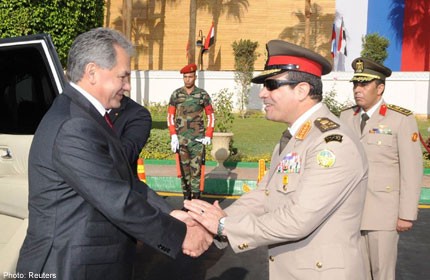Russian bear hug in the Middle East

Officials in Egypt have hailed as "historic" a visit by a high-level Russian delegation headed by Foreign Minister Sergey Lavrov and Defence Minister Sergey Shoigu, the first of its kind in decades.
The communique at the end of the talks provided no specifics, but General Abdel Fattah al-Sisi, the head of the Egyptian army and the country's de facto leader, said the Russians' visit signalled the start of "a new era of enhanced military cooperation".
Mr Shoigu indicated on Sunday that a reputed US$2 billion (S$2.5 billion) arms deal was in the works: "We agreed that in the nearest future, we will take steps for the legal implementation of our deals."
Russia's potential breakthrough is part of a pattern. After having been marginalised for the better part of half a century, it is now being courted in the Middle East. The only question is whether Moscow is able to meet the often contradictory expectations of its newly found Arab partners.
Historically, the Middle East has given Russia more grief than gain. It was there that the Soviet Union made its first global inroads after World War II, but it was also there that the Soviets registered their first strategic defeats.
During the late 1940s, Moscow actually saw newly independent Israel as its chief anchor in the Middle East, but it then quickly switched its attention to Egypt's charismatic leader, Mr Gamal Abdel Nasser, who wanted to overthrow all the region's pro-Western monarchies.
The Russians invested lavishly in Egypt's big infrastructure projects, including the Aswan Dam on the Nile River and in the military. By the late 1960s, the Soviet Union had no fewer than 20,000 military advisers in the country.
But Egyptian President Anwar Sadat, who succeeded Mr Nasser, expelled them all, and forged instead a strong partnership with the United States.
All the other Arab states eventually ditched their links with Russia. The only exception was Syria, which is why Russian President Vladimir Putin has been so determined to prevent the fall of the current Syrian government.
In theory, Mr Putin's dogged defence of Syrian President Bashar al-Assad should make Russia a pariah in the Middle East: all other Arab rulers want Mr Assad toppled.
Yet, paradoxically, the Russian behaviour has won grudging admiration. Everyone has noted that, while the US dumps its own allies at first sight of any difficulty, Russia sticks by its friends regardless of the risks involved.
The Egyptian government also feels humiliated by constant US preaching on how it should run the country. So, although Egyptian Foreign Minister Nabil Fahmy insists that his country is not looking for a "substitute for anyone", better ties with Russia are intended to provide precisely that.
Egypt is, however, effectively bankrupt.
The arms package currently touted is only affordable because it's reputed to be financed by Saudi Arabia.
And the Saudis are keen to pay because they are infuriated by Washington's determination to sign a deal with Iran, which may slow down that country's nuclear programme but, the Saudis fear, could in return make Iran the Middle East's biggest regional power.
Saudi Arabia's use of Egypt as a proxy to administer a blow to the US may now be followed by a more explicit diplomatic opening between Riyadh and Moscow.
Prince Bandar bin Sultan, the kingdom's powerful intelligence chief, is widely rumoured to be planning a trip to Russia, where additional weapon contracts may be discussed.
Still, the obstacles facing Russia's return as a major regional player remain immense. Apart from weapons, it has nothing to offer. Russia is also cash-strapped, so it cannot afford generous credit terms which invariably go together with arms sales.
The Russians are also careful not to believe everything the Saudis and their allies say.
Mr Putin already got his fingers burnt when three years ago he was persuaded to cancel a planned delivery of surface-to-air missiles to Iran in return for a promised arms deal with Saudi Arabia which never materialised.
And the Arabs, in turn, don't have much faith in Russia either.
The Arab world's ruling elites tellingly keep their holiday homes and personal cash in the West. Russian weapons are also seen as technologically inferior, a fact painfully illustrated only recently, when Israeli cyberwarfare specialists were able to paralyse Syria's Russian-made air defence systems at will.
The Russians will have to persuade their new customers that, this time, their military products are better. And they will also have to persuade traditionally pro-Western Arab governments that Moscow is willing to distance itself from Iran and other, radical movements in the region.
Matching the US' influence in the Middle East will take more than just a few arms sales contracts.
jonathan.eyal@gmail.com
Get a copy of The Straits Times or go to straitstimes.com for more stories.